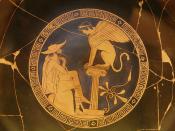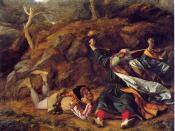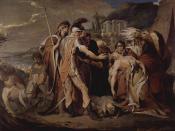Tragedy is a word most often used out of context. Few are probably able to completely comprehend the full capacity of the word, and therefore throw it around like it is a common occurrence. Horrible things happen in life, millions are murdered, lose loved ones, lose homes, yet all of these things combined can scarcely begin to describe the so abused word. In order to begin analysis of the word, one must first understand man, the human condition, and the nature of humanism. Man in true nature is evil. Only through a social and moral upbringing is man introduced to human nature which is kind, loving, and more able to gain a clear vision of the world. Natural nature however is something that man fights for, against all illusions of civil and social order and progress. This fight against the illusions of humanism is one of the great forms that tragedy takes on.
Tragedy celebrates the human condition. The force that instigates the whole process is the hubris; pride, an assumption of power beyond an individuals control. "Our human predicament, or condition, is that we have had to live with an undeserved sense of guilt." Often the hero, the tragic hero, will try and change his destiny so that tragedy can be avoided at all costs. Unfortunately the hero doesn't understand that destiny is that because of who the person is. Who you are creates your destiny. "Destiny needs us. It does not lead us; it waits for us." Therefore, because you are who you are, you are naturally going to make decisions that will affect your destiny; thus, changing one's destiny is impossible.
When reading a novel one likes to relate with the characters; feel their pain, their joy, laugh with them, cry with them, and get through hard...


